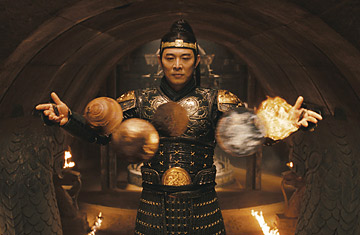
Jet Li as the Emperor in The Mummy: Tomb of the Dragon Emperor
Toward the end of The Mummy: Tomb of the Dragon Emperor, Jet Li and Michelle Yeoh launch into a vigorous sword fight — and what a grand pleasure it is to watch these two world-class stars in action again. In the mid-'80s-to-mid-'90s Golden Age of Hong Kong films, Li was mainland China's most gifted movie martial artist and Yeoh the preeminent fighting femme. They played together in only one previous picture: Tai Chi Master in 1993, the busiest year of the Hong Kong Renaissance, when the colony's robust movies enthralled action fans around the globe, and the leading actors were worked as hard as pre-teen seamstresses in a Guangzhou garment factory. (Li and Yeoh each made five other films that year.) Now both 45, they have lost little of their agility and none of their screen luster. Their duel atop the Great Wall of China is a reunion of titans, an Old Timers' Day for two actor-athletes still in their sinuous prime.
Forgive the effusions of an alter-kocker fanboy, but the flinty glamour of Li and Yeoh — buttressed by the stolid, sneering presence of top Hong Kong villain Anthony Wong Chau-sang (who in 1993 appeared in 15 films!) — is the best reason to catch this third in the series of Indiana Jones knockoffs. Brendan Fraser returns as adventurer Rick O'Connell, who, after vanquishing the same mummy twice in the 1999 and 2001 films, finally gets a new old adversary. But it's the Hong Kong veterans who are entrusted with Mummy III's real action, physically and dramatically.
In ancient China, the Emperor Han (Li) means to secure the secret of eternal life from priestess Zi Juan (Yeoh), who loves the Emperor's second-in-command Ming Guo (Amer-Asian hunk Russell Wong; he battled Li in the Hollywood actioner Romeo Must Die). But the priestess has placed a curse on the Emperor: his eyes start bleeding a brown syrup and, in no time, he turns into a chocolate soldier. He and his thousands of soldiers are encased in terracotta — until 1946, when a modern Chinese general (Anthony Wong) sets Emperor Han free to wreak havoc on his homeland. The big bad guy is back, and so is Zu Juan, along with the daughter (Isabelle Leong, from the Hong Kong horror film The Eye 3) she had by Ming Guo. Age-wise, the two heroines are pushing 2,300, but they're still steely of resolve. And dishy.
You see? You can relate the movie's main plot, concocted by writers Alfred Gough and Miles Millar, without mentioning the Anglos: Rick, his wife Evelyn (Maria Bello, sporting an English accent of varying plumminess) and their grown son Alex (Luke Ford). After their last escapade, Rick and Evelyn have sworn off derring-do; she writes books about the good old days while he goes fly-fishing and gets a hook stuck in his neck. Their love life is a comedy of missed opportunities, of derring-don'ts. When the British government asks them to deliver a valuable document to Shanghai, they jump at the chance to throw off the sedate life and immerse themselves in the one thing that makes them feel alive: peril. It happens that Alex has taken up his dad's trade of amateur archaeologist / tomb raider. Guess what he's stumbled on: the key to unleashing the Emperor and his army.
As directed by Rob Cohen, whose high-hack work includes Dragon: The Bruce Lee Story and The Fast and the Furious, this Mummy movie is really two movies: a good adventure epic, with all the Chinese people, and a wan one, with O'Connells and the other the Westerners. Their character motivation is sketchy, their verbal wit scant; at times a scene revs to its climax and, instead of issuing some clever deflating retort, the actor will gaze dumbly into the camera, as if this were a rough cut, with the punch line to be edited in later. To camouflage the dearth of smart dialogue, Fraser and Bello indulge in sheepish smiling and sweet preening; the film's working title might have been Indiana's Clones and the Dimple of Tomb. Fraser and Ford do get to run around a lot, and knock out some malefactors, but they are largely occupied staring at the real action stars and the special effects.
These are pretty terrific. The tomb Alex enters has crafty trap doors and cool gear mechanisms (yes, just like the ones in the real Indiana Jones movies, but deftly executed nonetheless). The terracotta warriors, once they are revived, move with the balletic precision of armored Rockettes. There's a decent chase scene through Shanghai streets with Art Deco buildings draped in chinoiserie. The whole production is handsome, and the second-unit work first-rate. Finally Li and Yeoh have their big face-off, and the movie rekindles old Hong Kong glories while offering some new ones of its own.
The Hong Kong renaissance evaporated about ten years ago, as the People's Republic took control of the colony; Hollywood summoned many of the best Chinese stars, directors and stunt coordinators for occasional work; and, after a decade or so of hyperactivity, the movement wore itself out, allowing American action films to appropriate a little of its supernal energy. That crazy-wonderful movie spirit may be dead now, but in The Dragon Emperor you'll find some limber ghosts from Hong Kong's Golden Age.
